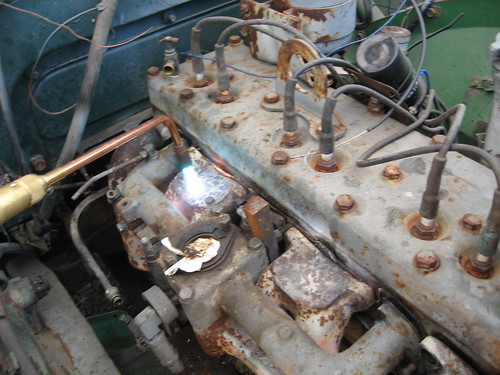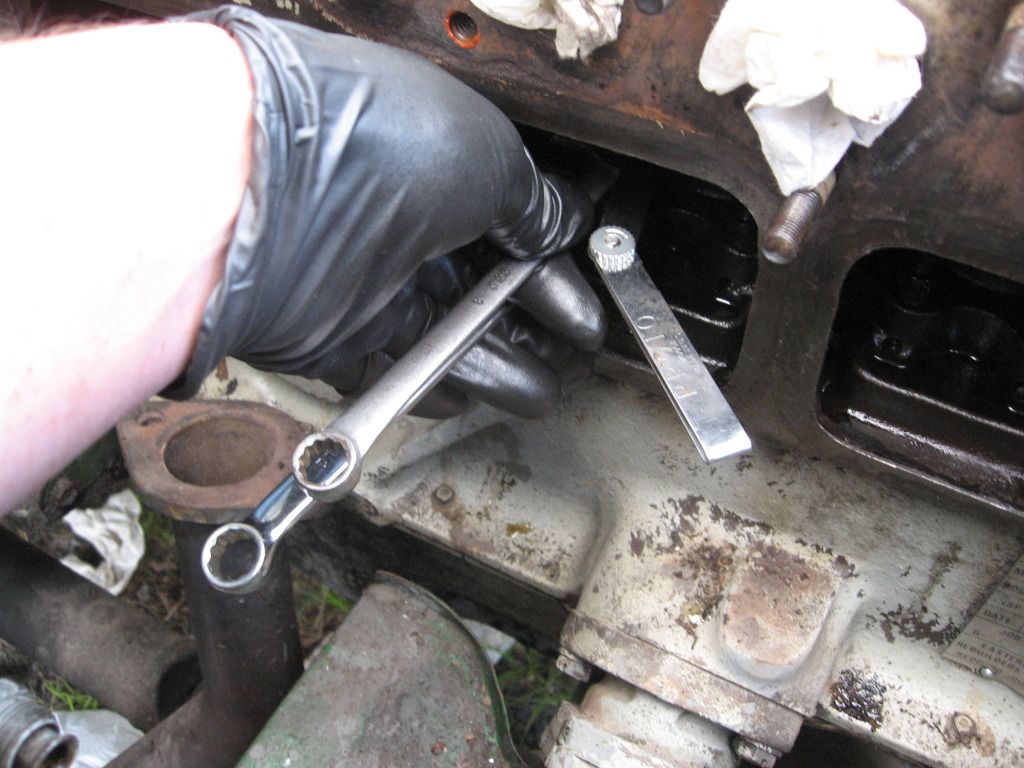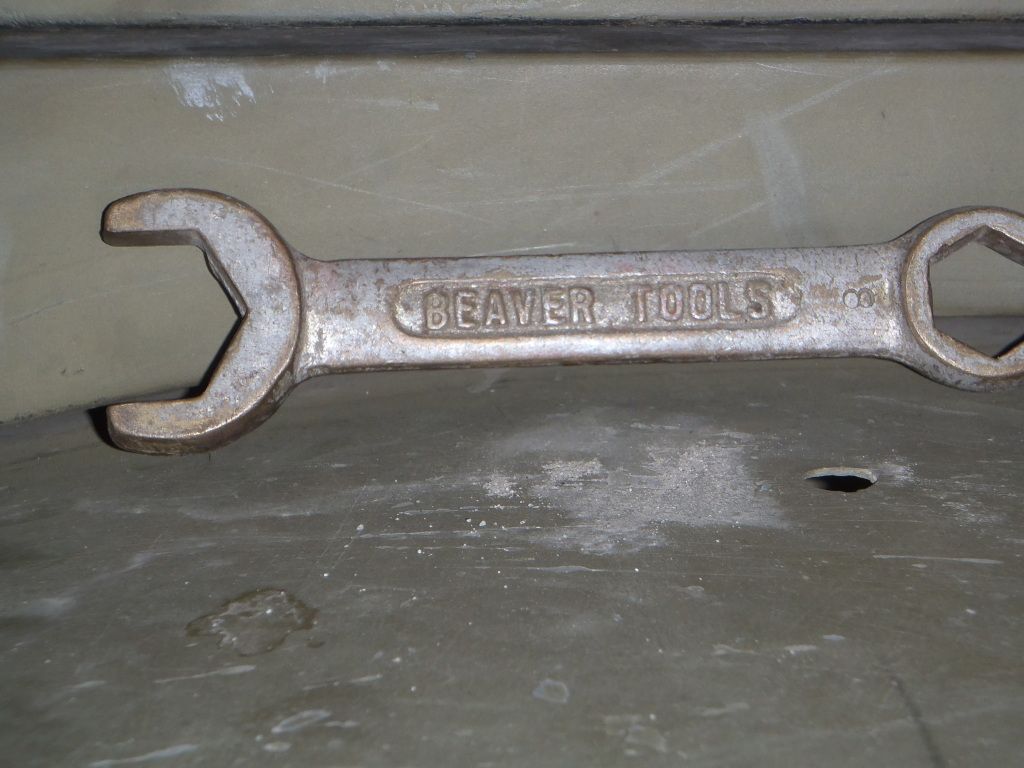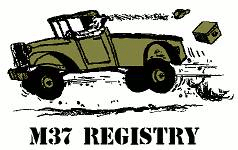Exhaust Manifold Stud Removal
Moderators: Cal_Gary, T. Highway, Monkey Man, robi
Exhaust Manifold Stud Removal
This is something I have never dealt with, what is involved in the removal a stud from the Carb/Exhaust manifold mount?
Bruce,
1953 M-37 w/ow
Retired Again
Keep Em Rollin'
VMVA
1953 M-37 w/ow
Retired Again
Keep Em Rollin'
VMVA
Re: Exhaust Manifold Stud Removal
since i don't have the proper tool (stud extractor) i've got the job dun by locking two nuts together on the stud and turning the inner nut with a wrench.
care should be taken with the manifold studs they go into the water jacket. heat may be required http://www.g741.org/PHPBB/viewtopic.php?f=3&t=4703
http://www.g741.org/PHPBB/viewtopic.php?f=3&t=4703
care should be taken with the manifold studs they go into the water jacket. heat may be required
 http://www.g741.org/PHPBB/viewtopic.php?f=3&t=4703
http://www.g741.org/PHPBB/viewtopic.php?f=3&t=4703.............................. use it ...............
Re: Exhaust Manifold Stud Removal
Thanks RMS, I will do that, it makes good sense.
Bruce,
1953 M-37 w/ow
Retired Again
Keep Em Rollin'
VMVA
1953 M-37 w/ow
Retired Again
Keep Em Rollin'
VMVA
Re: Exhaust Manifold Stud Removal
That worked like a charm!! Thanks Again RMS!
Bruce,
1953 M-37 w/ow
Retired Again
Keep Em Rollin'
VMVA
1953 M-37 w/ow
Retired Again
Keep Em Rollin'
VMVA
Re: Exhaust Manifold Stud Removal
happy i could help. I would clean up the block with a tap  and do a valve adjustment wile the manifold is off
and do a valve adjustment wile the manifold is off 
 and do a valve adjustment wile the manifold is off
and do a valve adjustment wile the manifold is off 
.............................. use it ...............
Re: Exhaust Manifold Stud Removal & Off Topic ?
Couldn't help but notice your, "King Dick" ratchet, is that British?
Bruce,
1953 M-37 w/ow
Retired Again
Keep Em Rollin'
VMVA
1953 M-37 w/ow
Retired Again
Keep Em Rollin'
VMVA
Re: Exhaust Manifold Stud Removal
yup it be english . its an aircraft wrench made out of aluminum 
 I am what I use
I am what I use 
 king dick!
king dick! 
.............................. use it ...............
- sturmtyger380
- SFC

- Posts: 577
- Joined: Sun Oct 21, 2007 5:13 pm
- Location: Up State SC
Re: Exhaust Manifold Stud Removal
Now that the wrench is out of the way. 
Is there any difference in adjustments if the valves are done hot or cold?
Is there any difference in adjustments if the valves are done hot or cold?
47 CJ2A
53 M38A1
52 M37
51 M38
67 M416
?? M101A1
53 M38A1
52 M37
51 M38
67 M416
?? M101A1
Re: Exhaust Manifold Stud Removal
It's a lot easier done cold, you stand a good chance of getting burned doing them hot, ask me how I know 
Here is what Charles posted on the subject:
If everything has been renewed & properly lapped into their seats with the tappet screws faced flat, .010" intake & .013" exhaust is a good COLD set up. The actual hot setting you need is .009" intake - .011" exhaust, the cold settings will tighten to the proper hot setting as the engine warms to normal temp due to heat expansion. These cold settings are also good for use in engines that have been run many miles & simply need a valve clearance adjustment when performing normal maintenance. If the tappet screws have not been faced flat, you will need to set up COLD at least .001" tighter on both intake & exhaust. The reason for this is it is normal for the face of the tappet screws to indent slightly, this is normal wear. When this happens a ridge around the outer edge of the screw face where the valve stem never hits becomes very evident. When adjustments are measured with a feeler gauge, it is on top of that ridge instead of where the valve stem actually contacts the screw face, thus the adjustment will be wider than the feeler gauge says because of the indent. In engines with a LOT of wear or indent in the screw surface, it may be necessary to bring the COLD adjustment as tight as .008" intake - 011" exhaust, but in most cases only .001" tighter will take care of it & produce a good running non-ticking set up. Remember these guidelines are for engines that are in good condition as far as the valve train is concerned. Ticking can also come from worn tappet bores in the block which allow the tappets to be pushed side ways slightly instead of straight up by the cam lobes. This condition will also produce a ticking noise that can be mistaken for loose valve clearance adjustment. If an engine has excssive wear in the tappet bores, the ticking noise will continue no matter what the adjustment. Also remember that a too tight adjustment can cause leaking valves & eventually burned valves. When your engine is started after adjustments are completed, it should be warmed up to normal operating temp. If all looks & sounds OK you should be set, go ahead with closing everything up. If you feel further fine adjustment is needed, let the engine COOL DOWN THOROUGHLY before readjusting, always remember you are working with COLD settings.
Here is what Charles posted on the subject:
If everything has been renewed & properly lapped into their seats with the tappet screws faced flat, .010" intake & .013" exhaust is a good COLD set up. The actual hot setting you need is .009" intake - .011" exhaust, the cold settings will tighten to the proper hot setting as the engine warms to normal temp due to heat expansion. These cold settings are also good for use in engines that have been run many miles & simply need a valve clearance adjustment when performing normal maintenance. If the tappet screws have not been faced flat, you will need to set up COLD at least .001" tighter on both intake & exhaust. The reason for this is it is normal for the face of the tappet screws to indent slightly, this is normal wear. When this happens a ridge around the outer edge of the screw face where the valve stem never hits becomes very evident. When adjustments are measured with a feeler gauge, it is on top of that ridge instead of where the valve stem actually contacts the screw face, thus the adjustment will be wider than the feeler gauge says because of the indent. In engines with a LOT of wear or indent in the screw surface, it may be necessary to bring the COLD adjustment as tight as .008" intake - 011" exhaust, but in most cases only .001" tighter will take care of it & produce a good running non-ticking set up. Remember these guidelines are for engines that are in good condition as far as the valve train is concerned. Ticking can also come from worn tappet bores in the block which allow the tappets to be pushed side ways slightly instead of straight up by the cam lobes. This condition will also produce a ticking noise that can be mistaken for loose valve clearance adjustment. If an engine has excssive wear in the tappet bores, the ticking noise will continue no matter what the adjustment. Also remember that a too tight adjustment can cause leaking valves & eventually burned valves. When your engine is started after adjustments are completed, it should be warmed up to normal operating temp. If all looks & sounds OK you should be set, go ahead with closing everything up. If you feel further fine adjustment is needed, let the engine COOL DOWN THOROUGHLY before readjusting, always remember you are working with COLD settings.
Carter
Life Member:
Delta, Peach Bottom Fish & Game Assn.
Life Member:
Delta, Peach Bottom Fish & Game Assn.
Re: Exhaust Manifold Stud Removal
back to fun tools: every guy should have 




.............................. use it ...............
Re: Exhaust Manifold Stud Removal
Here is some info I wrote up on changing the manifold:
http://blog.gieselman.com/post/Dodge-M3 ... ement.aspx
be sure to use the correct brass spacers that allow for some expansion to prevent manifold cracking.
http://blog.gieselman.com/post/Dodge-M3 ... ement.aspx
be sure to use the correct brass spacers that allow for some expansion to prevent manifold cracking.




